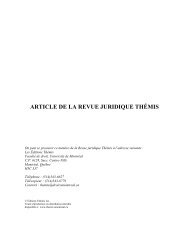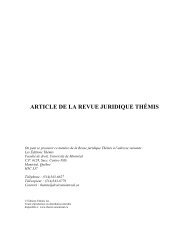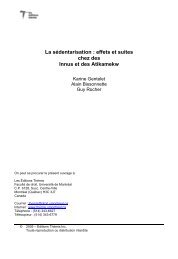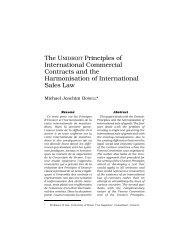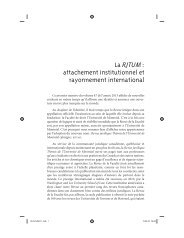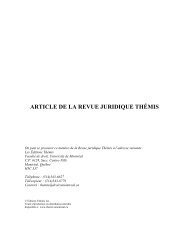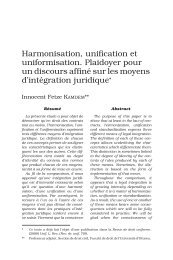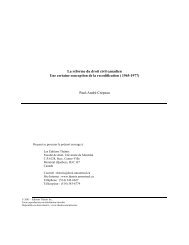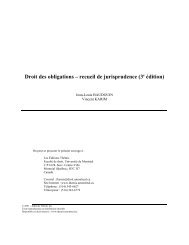The UNIDROIT Principles of International Commercial Contracts and ...
The UNIDROIT Principles of International Commercial Contracts and ...
The UNIDROIT Principles of International Commercial Contracts and ...
Create successful ePaper yourself
Turn your PDF publications into a flip-book with our unique Google optimized e-Paper software.
THE <strong>UNIDROIT</strong> PRINCIPLES AND MERCOSUR COUNTRIES 401<br />
the values <strong>of</strong> freedom <strong>of</strong> contract (autonomy <strong>of</strong> will) <strong>and</strong> <strong>of</strong> the<br />
binding nature <strong>of</strong> the contracts (pacta sunt serv<strong>and</strong>a) 43 .<br />
In Argentina, for instance, material autonomy is based on Article<br />
1,137 (principle <strong>of</strong> freedom <strong>of</strong> contract) <strong>and</strong> Article 1,197 (pacta sunt<br />
s e r v a n d a ). Along those lines, the Argentine Supreme Court<br />
recognized, in the case G o v e rnment <strong>of</strong> Peru v. Sifar, the validity <strong>of</strong><br />
the F.O.B. clause agreed by the contracting parties. At first sight,<br />
the judgment could be interpreted as the acceptance <strong>of</strong> the choice,<br />
made by the contracting parties, <strong>of</strong> a norm integrating the so-called<br />
lex mercatoria. However, in the particular case, the Supreme Court<br />
recognized the material autonomy <strong>of</strong> the parties, relating to the<br />
f reedom <strong>of</strong> contract <strong>and</strong> to set the contents <strong>of</strong> the agreement, as the<br />
rule in question had been incorporated into the contract by the<br />
parties themselves. <strong>The</strong>refore, the court didn’t deal with the party<br />
autonomy principle at private international law level, which would<br />
ultimately have resulted in submitting the agreement to the rules<br />
<strong>of</strong> a non-State legal system 44 .<br />
Within the MERCOSUR the incorporation <strong>of</strong> the <strong>Principles</strong> into a<br />
contractual agreement can re p resent an efficient alternative to their<br />
choice as the law applicable to the contract. We must, however, take<br />
into account the fact that in those situations the functioning <strong>of</strong> the<br />
<strong>Principles</strong> shall take place in the context <strong>of</strong> <strong>and</strong> in accordance with<br />
the relevant rules <strong>of</strong> a given national legal system.<br />
B. <strong>The</strong> <strong>Principles</strong> as the Law Governing the Contract<br />
<strong>The</strong> <strong>Principles</strong> can be chosen by the parties as the law govern i n g<br />
the contract, in which case no national laws may be applicable to<br />
the agreement. <strong>The</strong> application <strong>of</strong> the <strong>Principles</strong> as the govern i n g<br />
law can also result from the circumstances that involved the<br />
agreement’s conclusion <strong>and</strong> performance, in which case the choice<br />
<strong>of</strong> the <strong>Principles</strong> as the law applicable is incumbent on the arbitrators<br />
or the judge to whom the case is submitted.<br />
43 A l e j a n d ro GARRO, “Unification <strong>and</strong> harmonization <strong>of</strong> private law in Latin<br />
America”, 40 Am. J. Comp. L. 609 (1992). For an excellent analysis <strong>of</strong> the values<br />
shared between the <strong>Principles</strong> <strong>and</strong> the new Civil Code <strong>of</strong> Quebec (Canada), see:<br />
Paul-André CRÉPEAU, with the collaboration <strong>of</strong> Élise M. CHARPENTIER, L e s<br />
Principes d’UN I D R O I Tet le Code civil du Québec : valeurs partagées?, S c a r b o ro u g h ,<br />
Carswell, 1998.<br />
44 N. de ARAUJO, op. cit., note 13, p. 73.



